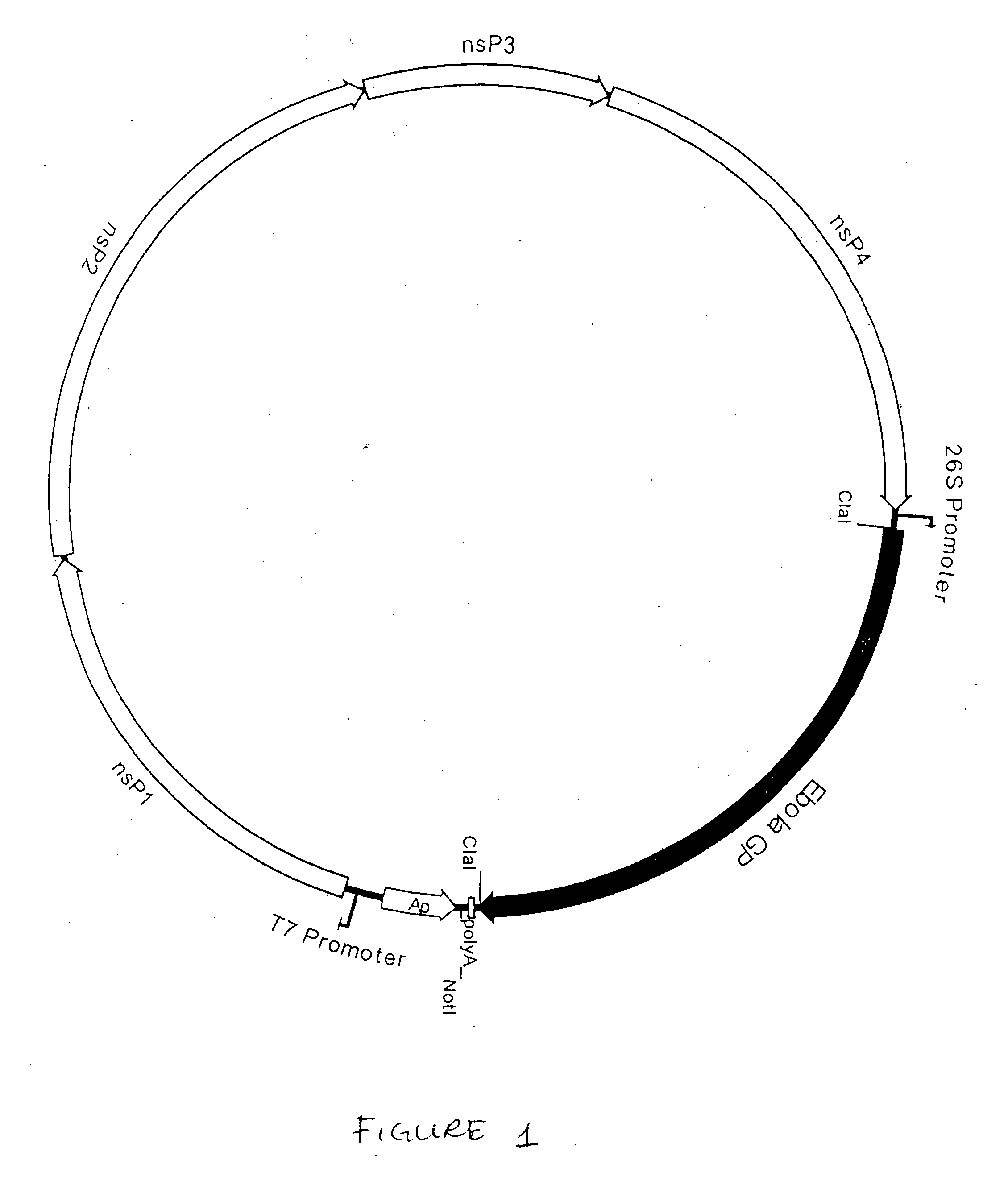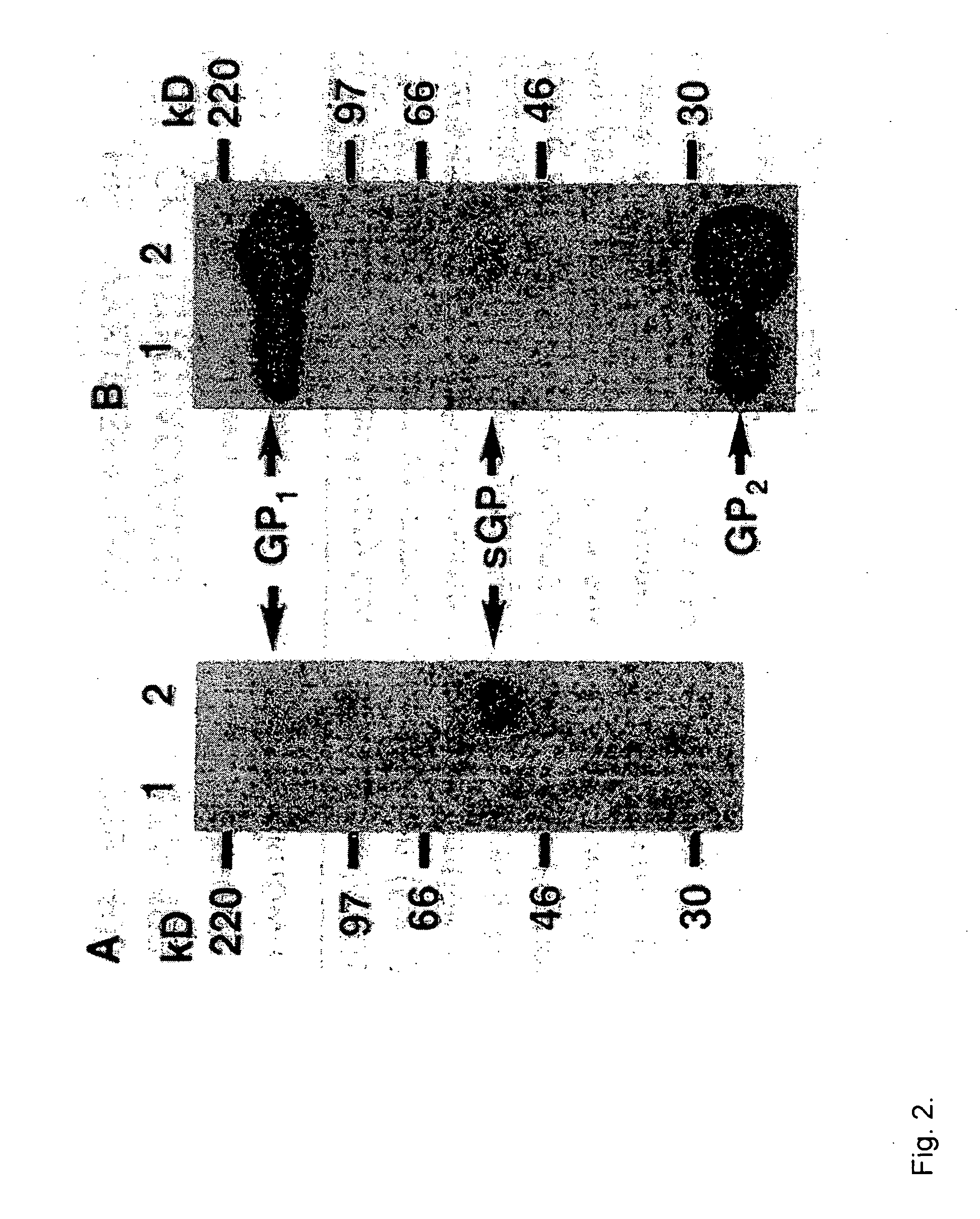Monoclonal antibodies and complementarity-determining regions binding to ebola glycoprotein
a technology of complementarity and antibodies, applied in the field of monoclonal antibodies and complementarity-determining regions binding to ebola glycoprotein, can solve the problems of not always predicting the protective effect of mabs, and inhibiting plaque formation
- Summary
- Abstract
- Description
- Claims
- Application Information
AI Technical Summary
Problems solved by technology
Method used
Image
Examples
example 1
Production and Characterization of Ebola GP MAbs
[0108] To obtain MAbs specific for the glycoprotein of Ebola virus, mice were vaccinated with VEE virus replicon particles (VRP) that express Ebola GP (EboGP-VRP). Spleen cells from two mice that were vaccinated with EboGP-VRP were pooled and fused with P3X63Ag8:653 myeloma cells as described in Methods. In order to detect hybridomas producing antibodies that reacted with the GP of Ebola virus, 1,738 hybridoma supernatants were screened by ELISA for their ability to react with Ebola Zaire virion proteins and by indirect immunofluorescence assay (IFA) for their ability to react with BHK cells infected with EboGP-VRP. The initial screening by ELISA and IFA resulted in 616 positive cultures. Forty of these cultures were chosen for further analysis and were cloned twice by limited dilution. Twenty-seven of the hybridoma cultures continued to react specifically with the Ebola GP throughout the cloning process. The other hybridoma cultures ...
example 2
Protective Efficacy of Ebola GP MAbs in Vivo
[0109] In order to determine the protective efficacy of the Ebola GP MAbs, purified MAbs were evaluated for their ability to protect mice from a lethal Ebola challenge (Table 3). In addition, competitive binding assays were performed to determine if the MAbs were recognizing the same epitope or unique epitopes on the Ebola GP (Example 3, Table 4). Fourteen of the MAbs tested in competition assays reacted with 5 different epitopes (Table 5). Ten of these 14 MAbs protected both BALB / c and C57BL / 6 mice from a lethal challenge with mouse-adapted Ebola Zaire virus when 100 ug of purified MAb was administered 24 hours before challenge (Tables 3 and 5), demonstrating that antibodies that bind to any one of these Ebola GP epitopes can protect against lethal challenge.
[0110] To determine the effective dose of the protective MAbs, BALB / c mice were injected with either 50 ug, 25 ug, or 12.5 ug of purified Ebola GP MAbs 24 h prior to challenge with ...
example 3
Competitive Binding of Ebola GP MAbs
[0112] This study identified protective GP-specific MAbs that were classified into five groups on the basis of competitive binding assays. One protective MAb from each of these five different competition groups was chosen for further characterization and was submitted to ATCC as a representative of the competition group. Competitive binding between biotinylated and unlabeled MAbs for the GP of the Ebola Zaire 1995 virus was evaluated by ELISA. The results of the binding assays for the prototypical protective MAb from each competition group are depicted in Table 4. Except for one instance of one-way competition (between the group 4 and 5 MAbs), competition between labeled and unlabeled MAbs was reciprocal.
TABLE 4Competitive Binding of Ebola GP MAbsCompeting Unlabeled MAbBiotinylated MAb13F66D812B513C66D313F60.30.80.51.01.26D80.60.20.60.60.712B50.30.30.10.20.313C60.60.70.60.10.56D30.50.60.60.10.2
[0113] Nonprotective MAbs were identified that boun...
PUM
| Property | Measurement | Unit |
|---|---|---|
| body weight | aaaaa | aaaaa |
| body weight | aaaaa | aaaaa |
| body weight | aaaaa | aaaaa |
Abstract
Description
Claims
Application Information
 Login to View More
Login to View More - R&D
- Intellectual Property
- Life Sciences
- Materials
- Tech Scout
- Unparalleled Data Quality
- Higher Quality Content
- 60% Fewer Hallucinations
Browse by: Latest US Patents, China's latest patents, Technical Efficacy Thesaurus, Application Domain, Technology Topic, Popular Technical Reports.
© 2025 PatSnap. All rights reserved.Legal|Privacy policy|Modern Slavery Act Transparency Statement|Sitemap|About US| Contact US: help@patsnap.com


